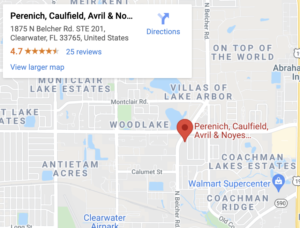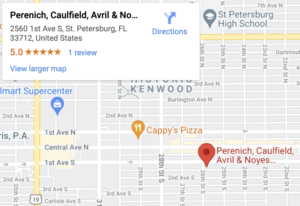
If you were injured on the job in Florida, you are likely covered by the state’s workers’ compensation program. Most Florida employers are required by workers’ comp laws to purchase workers’ compensation insurance coverage for their employees. Workers’ comp benefits provide medical treatment and loss of income benefits for injured workers.
Before you file a workers’ compensation claim, becoming familiar with workers’ compensation terms could be helpful. Sometimes doctors, insurance companies, and employers use terms without considering the injured employee might not be familiar with their meanings. It is important to understand what they are discussing, so you can protect your right to fair compensation after a Clearwater workplace accident.
Table of Contents
Florida Workers’ Compensation Glossary of Terms

Our Clearwater workers’ compensation lawyers have compiled the following glossary of workers’ comp terms that can be helpful to understand after a work-related injury or accident:
Arising Out of Employment
For an injury to be covered by workers’ compensation in Florida, it must meet the requirement of “arising out of employment.” Therefore, the injured party must be an employee, the employee must be engaged in job activities, and the job activities must be the proximate cause of the injury.
Average Weekly Wage (AWW)
Your AWW rate is the average weekly amount of earnings an injured worker received during the 13 weeks immediately before a work accident. It is the basis for all monetary benefits for lost wages paid through workers’ compensation.
Death Benefits
Death benefits are workers’ compensation benefits paid to the surviving dependents of a worker who dies because of a work-related injury or occupational illness.
Disability
A disability is an incapacity caused by an injury that prevents you from earning the same wages you did before the work injury. It applies to the job you performed when you were injured or any other type of work your doctor states you can perform, given the limitations of your condition.
First Report of Injury or Illness
Florida requires this form to be filed whenever a worker reports an injury. It provides details about the injury, information about the initial medical provider, the employee’s identifying information, and the employer’s identifying information. You should receive a copy of this form to read and ensure the information is correct.
Impairment Benefits
If you are permanently impaired because of a work accident, you can receive a monetary award. The amount you receive for impairment benefits depends on the severity of the impairment and the type of impairment.
Impairment Rating
This term refers to a disability rating your doctor provides that represents the severity of a physical disability. Medical examinations and standard guidelines determine impairment ratings.
Indemnity Benefits
Indemnity benefits are wage loss benefits paid to injured workers who cannot work. You must be out of work for more than seven days to receive indemnity benefits. Weekly indemnity benefits cannot exceed the maximum compensation rates for the year your illness or injury occurred.
Independent Contractor
An independent contractor works for themselves. They work on contract for someone instead of working as an employee. Independent contractors are typically not covered by workers’ compensation insurance.
Employers might try misclassifying employees as independent contractors to avoid workers’ comp claims or insurance premiums. Contact a Clearwater workers’ compensation lawyer immediately if you believe you are misclassified as an independent contractor.
Maximum Medical Improvement (MMI)
Maximum medical improvement is when no further medical treatment is expected to improve your condition. Some workers reach MMI when they fully recover from their injuries. However, other workers may reach MMI with permanent disabilities or impairments.
Permanent Impairment
Within Florida workers’ comp law, a permanent impairment is defined as “any anatomic or functional abnormality or loss determined as a percentage of the body as a whole, existing after the date of maximum medical improvement, which results from the injury.”
Temporary Partial Disability (TPD)
This term refers to money paid to injured workers who cannot return to full duty after a workplace accident. You can receive up to 80% of the difference between 80% of what you earned before the injury and what you can earn on restricted duty.
Temporary Total Disability (TTD)
Your workers’ comp benefits for wage loss if your doctor states you cannot return to work at all after a workplace accident. TTD benefits equal about two-thirds of your average weekly wages, up to the maximum benefits allowed for the year of your injury. The first seven days you miss from work are only paid if you are out of work for more than 21 days.
In some cases, a worker could receive up to 80% of regular wages for critical injuries. Critical injury TTD benefits are paid up to six months after a work-related injury.
Time of Injury
The time and date when the accident or incident resulted in the worker’s injury. The time of injury should be reported on the First Report of Injury form mentioned above.
What Should I Do if I Am Injured on the Job in Clearwater, FL?
Report the accident to your employer as soon as possible. You have just 30 days to report the injury, or you could lose your workers’ compensation benefits.
Seek medical treatment for your injuries immediately. In non-emergencies, you must seek medical treatment from a medical provider approved by the workers’ compensation insurance provider. In an emergency, you can go directly to the emergency room for treatment.
You should receive a notification that the insurance company is investigating your claim. If your employer does not notify the insurance company of your claim within seven days, you can contact the insurer directly.
The insurance company has an obligation to act promptly regarding claims, but it does not have a specific deadline for deciding your claim. You should seek legal advice if you do not receive a response in a few weeks.
Regardless of whether the insurance company accepts or denies your claim, talking with a Clearwater workers’ compensation attorney is beneficial. An attorney explains your rights and obligations as an injured worker.
Your lawyer also handles filing a claim, appealing denials of workers’ comp claims, and negotiating workers’ compensation settlements. With an attorney on your side, you can trust that someone is looking out for your best interests and fighting to get you all the workers’ comp benefits you deserve.
Schedule a Free Consultation With Our Clearwater Workers’ Compensation Lawyers
Do you have questions about a Florida workers’ compensation claim? Contact our law firm at (727) 796-8282 to schedule a free initial consultation with one of our experienced Clearwater workers’ compensation attorneys.
Our legal team at Perenich, Caulfield, Avril & Noyes Personal Injury Lawyers stands up for the rights of injured workers. We fight to get you the benefits and compensation you deserve after a work-related injury or workplace accident.


